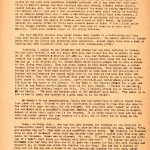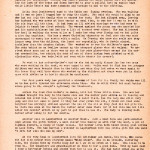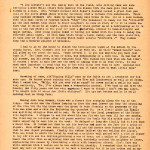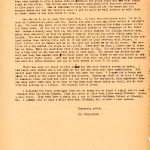Pine Mountain Settlement School
Dr. Ida Stapleton and Rev. Robert Stapleton
Line Fork 1927 – 1947
STAPLETON REPORT – October 1930
“One of our great events during the year is the Fair at Pine Mt. …”
GALLERY
TRANSCRIPTION
October 1930
Line Fork Settlement
One of our great events during the year is the Fair at Pine Mt and quite a number of the Line Fork neighbors attended although few if any from here take anything to exhibit except the Hall brothers who make brooms, hickory bottom chairs, walnut tables, etc. Our aim though is to interest the women in taking something for the exhibit and to that end I make conversation about what might easily be carried. As an example along this line I made a few things – two little hand sewn dresses, a knitted underskirt and along with these two vases of marigolds and one of zinnias were taken besides two plates of cookies and a loaf of white bread. My zinnias secured the second prize for there were several vases of them. I had a first prize on the orange African marigold. Every yard has some of these so no more could exhibit. There were several vases of the lovely dahlias.
The four exhibit shelves like plant stands were placed in a half-circle and very tall corn stalks placed at the back in a fine arrangement. The school exhibit of canned goods was in the center and attracted much attention. Almost every home does a deal of canning and each housewife shows her store with commendable pride.
Yesterday I called twice to see Grace who had broken her leg when carrying in fodder. She had just twisted it and the small bone only was broken but she is unable to walk on it and is therefore a shut-in for awhile. Joe, her husband, is somewhat of an invalid but a year ago he did manage to dig out a cellar from under the log house and had put up some shelves for the canned fruit which before always had to have a corner of the living room floor. They had sixty quarts of wild black raspberries, a rather unusual thing as they are not as plentiful as blackberries. This couple met in Texas during the war and both were doctors’ assistants so knew some of the principles of hygiene and antiseptics but cannot apply them to the care of the home and their two little boys. They had lived together some years but last Spring we saw a notice in the local paper of their marriage license. Joe’s father, Si, and mother, Mandy, live at the old home at the mouth of the Branch. Si has been in the Federal prison for a year and a half so had Brad, a son-in-law, who lives on the same Branch. I called to see Betty, his wife, and her babies, Cannie and Otis. Joe, a helpful little boy of twelve, is of the family. “He does the hardest part of the washing” said Betty. “The water is so low we had to carry the clothes to a pool away up in the woods”.
At Mandy’s is her granddaughter, Rosie, who has never been to school though fourteen years of age. I tried to get her interested in learning to read when she came to the Cabin with eggs for sale, but she refused. Now they have been “lawed” so little Joe and Rosie with a neighbor’s daughter, Carrie, are going over the hills to Delphia School of which their uncle Joe is the trustee. It is three miles to walk all the way thru the forest except the last quarter of a mile, but it never can be muddy as the water all runs off so promptly.
Susan, on Stony Fork, who had her eyes treated for trachoma at the hospital in Richmond (this State) brought her baby out to show me when passing one day, saying “I’ve got another big boy”. “And what is his name?” the doctor asked. “He (meaning her husband) aims to call it Solomon.” Going that way another time later I called with some tiny garments for Solomon. Susan was so pleased. She said, “I reckon I wouldn’t have had nothing if I hadn’t kept those you brought when Dovie was here”. The latter was going to Richmond with her baby but when the R R pass was secured for here, she lost courage and wouldn’t go, so Susan was given the clothes for her baby. She had had a midwife to help her for the day and a woman to do the washing and cooking for five days, after which Susan got up and did it for herself. She and the two boys and two girls were at dinner as I called so she invited me to “set down” with them, apologizing for the poor meal though there was sufficient – fried sweet potatoes, corn bread, fried apples, and buttermilk. The children were so intent on a picture scrapbook I had taken them, they did not stay long at the table. But Susan chatted with me till the least one began calling for attention. Another day when I passed the whole family were out gathering the last of the beans and Susan hurried to pour a pailful into my saddle bags while little Hattie had some tomatoes and turnips to add to the offering.
Melda from Leatherwood came to the Cabin one Sunday evening. She was walking and it was so late I begged her to stay the night. She said she would be glad to as she had not told the family when to expect her back. She had slipped away, leaving her husband who was never at home except at meal time, to see how it was to be with the six boys all the time. It had been an ill-advised marriage as she had come to Delphia to teach her first school. Tho warned against the young man she married him and his unfaithfulness had led her a life of torment ever since. She had blistered her heel in walking the seven miles so I made her stay over Monday and we had quite a nice day together. She has a sweet Christian character so feel sure she was much encouraged to carry her burden with a smile. On Tuesday she knew she could not stay longer away from the children, the least one especially, who is feeble minded, doubtless from the drunken father. She wanted me to see the children’s eyes also. She rode behind me on Swallow except up the steepest places when she walked. We arrived about noon and as there was no one at her poor place – bare except for the merest necessities, two chairs, the seat of one of these having been patched up with clothesline wire, two beds (with not even white sheets for covers).
We went to her mother-in-law’s and as she had an early dinner for her two sons who were working on the road, we were urged to eat. Melda went to find her two younger children and soon brought them to the table and when they had eaten we went again to the house they call home where she washed up the children and drops were put in their eyes with advice as to how it should be continued.
For four years Andy has provided a minimum of food for the family but Melda was ill so he has quite ignored her existence since then. She is still frail but much better since going to St Joseph’s Infirmary for treatment.
Across the road from Melda’s is Mamie, with her three little ones. She and her husband brought the baby to the Cabin once and the doctor gave advice as to feeding and ordered Cod Liver Oil. Upon inquiring, at a later visit, (as the baby was still very puny and did not seem to gain) if they had ever given the oil, I found out that some neighbor had strongly advised against the use of the oil so they just did not give it. As there was some at the Cabin the father later came there for it but this was not till after two months’ effort on my part to get them to use it. The baby is looking much better after using it for two months.
Another call on Leatherwood on another Susan. Such a neat home and yard – scarlet sage around the porch border, a moon flower vine making an arch over the door, a pot of begonia flowers, a clump of tiger lilies. Her mother lives down below Gilley post office on Line Fork. She had married a widower on Leatherwood with one little girl but she said “I love her like she was my own”.
At the very head of Leatherwood live Eli Whittaker and Mamie, his wife, who cares for her sick mother whom everyone names “Miss Gross”. She is an invalid, suffering much, but thinks that my visits help her so I go in as often as I can. She likes to be read to. Her daughters and granddaughter do read to her a good deal. With my last call I took a hot-water bottle and showed them how to use it. She had never owned one altho she could have afforded one and it would have been some comfort to her. Mamie had been out in the field helping to dig Irish potatoes. Upon my leaving I must also have a poke of them to which they added some sweet potatoes. The poke was tied to the saddle but at my next stopping place the flies tormented Swallow so much that she danced round until the ring came out of the saddle and the poke was dumped onto the ground. The rest of the way it had to be carried in my hand.
At Joe Cornett’s all the family were in the field, some cutting cane and some stripping leaves while others were passing the stalks thru the cane mill that was turned by a mule. Mrs Cornett herself with Susan’s husband tended a great flat pan full of the olive green juice boiling furiously over a furnace fire underneath. Their long handled skimmers are made by making nail holes in the lid of a lard bucket. With this much froth is removed before “they” (the molasses) is ready for the “stir-off”. At the last moment they shout to their neighbors to come on over; or if it is known before that it would be at night, quite a number would gather as at a merrymaking as it is one of the few events of the year for such a gathering, similar to bean-stringing and apple paring. Some young people boast of having put water with the juice to delay the stir-off until night. In this case there being a large family and the cane plentiful, it took four or five days of boiling which meant several “stir-offs”. They reckon they had a hundred gallons of molasses.
I had to go to the house to finish the inoculations begun at the school by the county nurse. Mrs Cornett left her post to go with me. As their “sweet-taters” were all piled on the porch she said, “take several! If you see anything you want just take it.” The least one, a boy of nine, was complaining of a sore toe. He had had it all summer, and his grown sister remarked that “she washed his feet when she had time”. Of course I tried to make her see the need of taking time to do that first. It was much more important to send that boy to bed with clean feet than to have inoculations for typhoid. But the County gives this free and it takes time to wash little boys’ feet.
Speaking of cane, old “Digging Billy” came to the Cabin to get a treatment for his sore eye. He talked about raising coal on Bee Hive and Leatherwood as well as on Stony. When I asked him, “Billy, did you ever raise cane?” he never smiled a smile but said very seriously, “No, I’ve always been a respectable person. I’ve been up and down the County for fifty years and can stay anywhere I want to though I don’t own any place. I’ve bought lots of shoes for little children”. His eye got better and he is still raising coal on Stony Fork.
Coming down Long Branch, there was a forest fire creeping along the top of the ridge. One could see the flames leaping up from the dead leaves and hear the crackling of the fire but the big trees were too green to burn fiercely so the progress of the fire was slow and a rain the following day quenched it. In a little glade Lou Riddle was splitting shingles from white oak. He is one of the local preachers of the Primitive Baptists. I stopped to ask him about his son Jim who has been ill for two months. The first day he returned after six years service for Uncle Sam his mother came to the Cabin expecting to meet him on the road. He delayed so long she finally had to turn back without him. It turned out that he and his brother had gone up the Fork for a drink of liquor. Soon after he was taken violently ill and the doctor from Cumberland told him that he was liquor poisoned. Finally the father indited the one selling the liquor. This one tried to avoid the trial by sending a neighbor well primed with a gift of liquor to buy off Jim and his brother, promising a sum of money and a gallon of liquor. Lou heard the offer from an adjoining room and very decidedly ordered the neighbor to leave, emphasizing his demand by flourishing a chair with immediate effect. Jim’s foot was still swollen when I called and he was suffering greatly. I remarked that he wouldn’t want any more of that liquor and if he felt a hankering for it he had better eat an apple. He nearly doubled up laughing as he thought of the difference between an apple and a drink of liquor. If it would serve everyone in the same way they might get afraid even to taste it. Another neighbor was arrested right at his still last week. He was soon released on an appearance bond and is free for the time being. But no one has been rash enough to give a peace bond of $3000.00 for young Henry who was also taken right at his still. His father and two cousins associated with him were sentenced to five years each. One is inclined to pity the families yet the women are the workers after all and the families seem to get on quite as well without as with them. At least there is one less mouth to fill.
One day an SOS came from Lynn Fork. In fact two messengers came. It is in such an inaccessible place and the family too poor to get any other doctor so wouldn’t I go. The best way would be up Old House Branch and crossing the ridge descend to the old Cress farm. At the top of the ridge Swallow looked at the steepness of the trail and turned directly away from it, but with a little coaxing she finally started down, going most carefully so that in safety I came to this old log cabin hidden away in a hollow. The sick man had been depending on his job in a coal mine some three miles distant rather than working this farm so it was more or less over-run with briars. A frail little girl of twelve met me at the gate and showed me up to the house. Two sections of a log served for steps to the porch. These were so high I almost had to clamber up them. Earl was suffering from a bad attack of flu. His delicate wife was nursing a tiny baby so she had not been able to wash much. His mother and sister-in-law with her baby had walked over from their place on Turkey Creek to see the doctor so she had a clinic right there. Earl had lost his first wife and this second one had accepted him with his three children and one of them seemed to have T B also.
There was only one chair in this cabin but two rude benches served as seats. I had taken some sheets and a bed gown so the bed was soon made more comfortable. His mother said that her daughter would come and wash for them. I longed for a broom and water to scrub up the floor but there was neither. During my visit of an hour I tried to reassure them, advised cod liver oil for three of the sufferers, then departed. Some ten days later news came to me that he had been much worse after my visit, but at that time was sitting up a little. One wonders how he lived.
I followed the trail down Lynn Fork not so steep but so rough I simply had to lead Swallow over the worst places. Near the mouth of this Fork lives Marsh Hibbard. Quite a nice house. They even have a radio and a son in Stewart-Robinson School at Blackey, Ky. I always like to chat a while with Mrs Hibbard; she is such a real person.
Sincerely yours,
THE STAPLETONS
**Transcription by Gretchen Rasch, May 2015.
BACK TO:
GUIDE TO DR. IDA STAPLETON AND REV. ROBERT STAPLETON REPORTS





